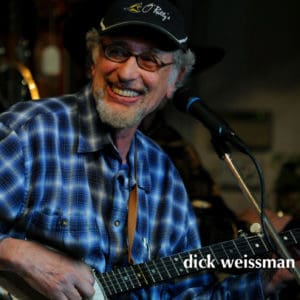Songwriter, banjo player, educator and author Dick Weissman has been a good friend and staple of our community since Swallow Hill’s founding. In the fall of 2019 we were honored to be inducted into the Colorado Music Hall of Fame in the same class as Dick.
Dick is set to receive another honor on Saturday, September 18 when he is inducted into the Colorado Authors Hall of Fame at the Renaissance Denver Central Park Hotel. If you don’t know where to begin with Dick’s written works, we recommend his 2016 memoir, The Music Never Stops: A Journey into the Music of the Unknown, The Forgotten, The Rich & Famous. The book is a rollicking look at Dick’s life in music, one that sees him crisscrossing the country as he recounts encounters with the likes of Pete Seeger, Karen Dalton, Gram Parsons, and many more.
According to their website, “The Colorado Authors Hall of Fame honors and promotes the works of outstanding published authors from all genres and generations to ensure their legacies will not be lost.”
CONCERT: See Banjo Masters: Jeff Jaros, Dick Weissman and Pete Wernick on April 9, 2022
With all of this happening we thought it would be a good time to catch up with Dick to see what he’s been up to in the last year and a half. It comes as no surprise that he’s kept busy with both music and writing. Read on to learn more, and congratulations Dick!
1. The last time a lot of us saw you was in the fall of 2019 when you were inducted into the Colorado Music Hall of Fame. You are about to be honored by another hall of fame – can you tell us about that?
The Authors Hall of Fame is relatively new; this is their second ceremony. They hold a rather fancy dinner, which in this case will be September 18th at the Renaissance Denver Central Park Hotel. It’s kind of odd to me, because although I am fairly well established in the Colorado music community, I’ve had virtually no contact with other Colorado authors.
2. Like most everyone else you’ve had to lay low during COVID-19 related closures and restrictions, what have you been up to during that time?
During the first part of the virus, I was writing a bunch of music. Then two different book deals came through, so I’ve been neglecting my playing a bit and have been working on the books. One is about the connections and appropriation that has governed the relationship between Black and white music and musicians in a variety of musical idioms.
I’ve got the first draft done, and it has been an enormous project. I’ll keep the second one under my hat until I’m further along.
In terms of the first project, I’ve become fascinated with what I call the Robert Johnson industry-the plethora of bios, novels, plays and even a book of poems written about him.
Many of them focus on the devil at the crossroads legend, his rambling nature, and his unfortunate death. I’ve come up with some questions about Johnson’s life that I feel remain unanswered. For example: why didn’t he move to Chicago? So many Mississippi bluesmen did, like Muddy Waters and Tommy McClennan, Big Bill Broonzy moved from Arkansas and so forth.
Did Robert have a plan to do this? If so, no one has ever discussed it. Staying mostly in Mississippi guaranteed a certain amount of obscurity in his lifetime.
3. What is something music has taught you over the last 18 months?
I guess I’ve seen a seemingly ever-expanding number of new, younger artists. I wonder how they will survive. Things were tough enough before the virus. More and more I respond against categorizing music. It’s sort of the old Duke Ellington comment: “There are only two kinds of music. Good music and bad music.” I’m not someone that’s going to like categories of music: like bluegrass, old-time, blues, singer-songwriter, etc. I tend to like music in each category that appeals to me, without endorsing the entire category. It bothers me that folk music fans tend to be too generous and not critical enough. I don’t think that’s helpful to artists. There are few music critics that I feel delve deeply into music.
4. Your music knowledge is encyclopedic, what have you been listening to lately?
Because of the book projects, I’ve listened to a ton of Black and Black-influenced music in country music, ragtime, jazz, classical music, etc. Some things surprised me. For example, close listening to Robert Johnson, even though I admire his work, made me a bit bored by his continual use of the same descending figure on many songs. One thing that I think is delicate, is that we identify artists through stylistic references and yet these same references can be an artistic prison if the artist is trapped in them.
5. Is there anything you’d like to add?
I’ve been working a bit on the 9 string banjo, something I bought fairly recently. It has its own sound, and more sustain than the 5 string is capable of. I’ll almost certainly do one of those tunes at the Spring Swallow Hill show with Jeff Jaros and Peter Wernick.
CONCERT: See Banjo Masters: Jeff Jaros, Dick Weissman and Pete Wernick on April 9, 2022
